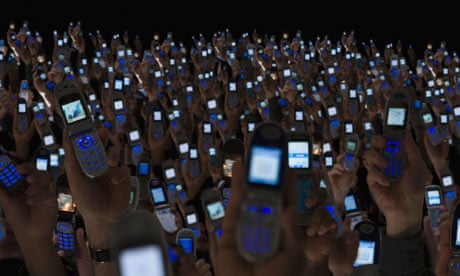The speed and scale of the world's love affair with mobile phones was revealed yesterday in a UN report that showed more than half the global population now pay to use one.
The survey, by the International Telecommunications Union (ITU), an agency of the UN, also found that nearly a quarter of the world's 6.7 billion people use the internet.
But it is the breathtaking growth of cellular technology that is doing more to change society, particularly in developing countries where a lack of effective communications infrastructure has traditionally been one of the biggest obstacles to economic growth.
By the end of last year there were an estimated 4.1bn mobile subscriptions, up from 1bn in 2002. That represents six in 10 of the world's population, although it is hard to make a precise calculation about how many people actually use mobile phones.
Africa is the continent with the fastest growth, where penetration has soared from just one in 50 people at the turn of the century to 28%.
Much of the take-up is thought to have been driven by money transfer services that allow people without bank accounts to send money speedily and safely by text messages, which the recipient - typically a family member - can cash in at the other end. Vodafone's M-Pesa money transfer service was launched in Kenya in 2007 and now has 5 million users.
The ITU report points to the Gambia, where mobile subscriptions have rocketed amid stiff competition among mobile operators. Out of almost a million telephone subscribers, there are more than 800,000 mobile subscriptions but only about 50,000 fixed telephone lines in service.
Developing countries now account for about two-thirds of the mobile phones in use, compared with less than half of subscriptions in 2002.
The adoption of mobile technology has outstripped the growth of fixed-line connections, which rose from 1bn to 1.3bn over the same period, with market penetration stuck just below 20% for some years.
The figures demonstrate that many people in the developing world are bypassing the older technology altogether.
In the developed world, many people use more than one mobile device, with subscriptions exceeding population by 11% in Europe.
On the other hand, a single mobile phone may have several users in poorer countries, where handsets are sometimes shared or rented out by their owners.
"There has been a clear shift to mobile cellular telephony," the ITU said. "In contrast to the growth in the mobile sector, fixed telephony has experienced nearly no growth in the last decade."
The agency painted a positive picture of a world being opened up and given fresh opportunities by improved communications: "The spread of mobile cellular services and technologies has made great strides towards connecting the previously unconnected."
The report also recorded a marked increase in internet use, which more than doubled from 11% of people using the net in 2002 to 23% last year.
Here the report identified a clear gap between the rich and poor world: fewer than one in 20 Africans went online in 2007, for instance, and less than 15% in Asia, whereas Europe and the Americas recorded penetration of 43% and 44% respectively.
Across the world just 5% of people have broadband internet at home, although this rises to 20% in the developed world.
In Africa, fixed broadband penetration stood at a mere 0.2% in 2007. But the report highlighted the potential of mobile broadband to expand the availability of high-speed internet access.
By the end of 2008, there were close to 335 million mobile broadband subscribers across the world, although not all of these would be users, the report conceded.
At the moment the developed world is far ahead, with 14% penetration in mobile broadband, compared with less than 1% in the developing world. The report found that there was a persistent "digital divide" between rich and poor countries in the use of communications technology.
Sweden was the world's most advanced country in the use of information and communications technology, in an index of 154 countries that took various factors into account such as access to computers and literacy levels.
South Korea and Denmark were placed second and third in the list, while the UK was ranked 10th.
"Despite significant improvements in the developing world, the gap between the ICT [information and communication technology] haves and have-nots remains," the report said.
One problem it identified was that the cost of mobile and internet services in developing countries was relatively high as a proportion of average income. The global economic downturn could also affect the development of communications technology if cash-strapped consumers cut their spending, the report said.
But its prognosis was relatively sanguine: "Despite the economic downturn, current global ICT developments are unlikely to change drastically, given the pervasive nature of information and communication technologies."
Calling Everest
Then you hear your mobile. Being 29,198ft above sea level is no longer an excuse for not answering. In 2007 China Telecom installed a mast near the Everest base camp.
With 100,000 phone masts erected each year, the number of places with "no signal" is dwindling fast. "More than 90% of the global population now has access," said Gabriel Solomon of mobile trade body GSMA. Even North Korea has lifted a ban, though access to handsets and international lines are heavily restricted.
Remote spots like Bhutan or Tibet are increasingly in reach. Networks are also covering Africa, with a $50bn investment in the sub-Sahara region alone. Only unpopulated areas like Antarctica or Chile's Atacama desert will remain off the hook. Closer to home, a few areas remain silent, but Solomon says that after the 2012 digital switchover UK coverage will be "ubiquitous".
Zoe Wood



